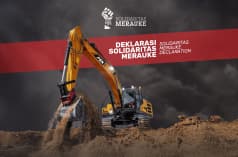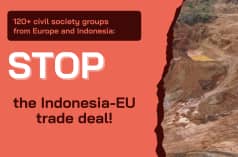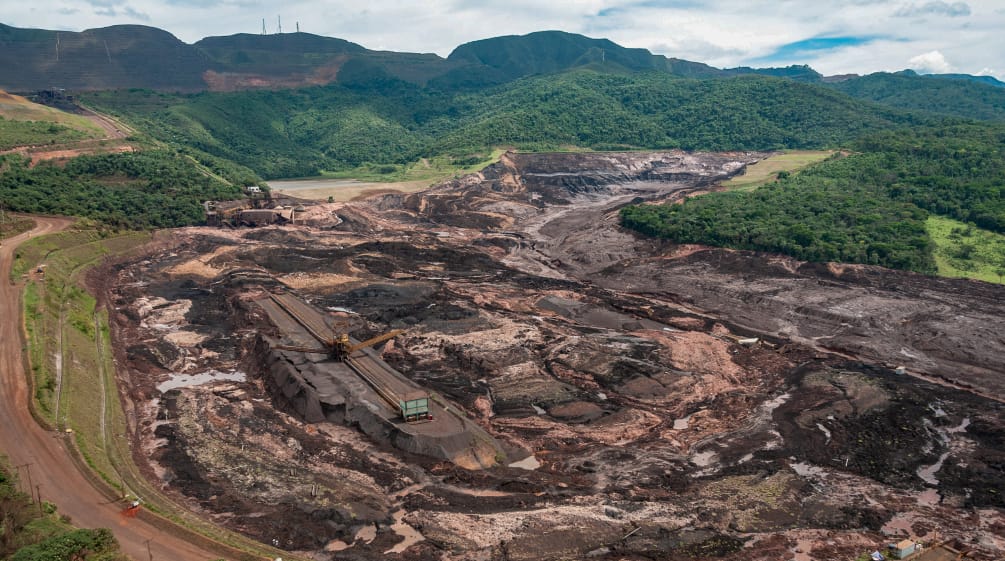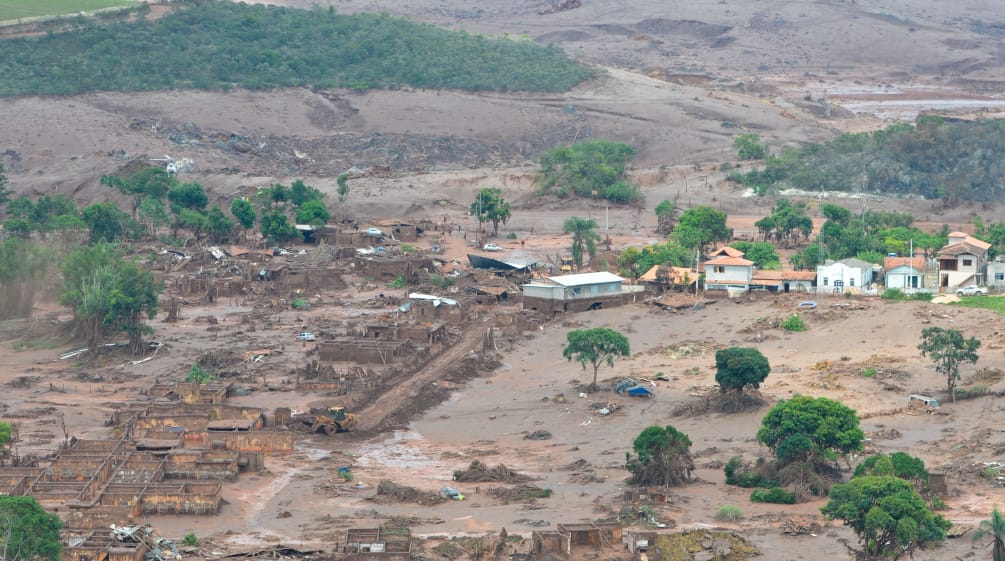Criticism of Vale mining company by AIAAV
May 16, 2024
The Brazilian NGO “International Articulation of Those Affected by Mining Company Vale” (AIAAV) presents arguments challenging several points of the management and accountability reports of the Vale mining company for the financial year 2023.
The dangers of tailings dams and irresponsible risk management
One of the biggest points of criticism of the network of people affected by Vale is the company’s omission of information about the risk of its tailings dams bursting. That fear is not unfounded: Tailings dam disasters have occurred twice recently on Vale’s mining sites in the state of Minas Gerais: in Brumadinho in 2019, with 273 deaths, and in Mariana in 2015, where 19 people lost their lives.
The perpetrators have not been punished – the criminal case has not been resolved and the victims have not received the compensation they expected. And while the lives lost are the most important thing, personal and material damages are vast, including the impact on the local economy due to the cessation of rural agricultural production, pollution, and damage to fauna and flora. The company’s other tailings dams are at various emergency levels and/or have negative stability conditions.
If all dams were as impeccable as Vale’s former president, Fábio Schvartsman, claimed, the B1 would not have collapsed, causing immeasurable loss and damage to thousands of people in the Paraopeba river basin.”
- Fernanda Martins, Executive Secretary, AIAAV
While communities demand the closure of the mine, Vale’s plans for the Paraopeba complex, where the Brumadinho crime (referred to as an “event” by the company on page 53 of its report) occurred, are unclear. What’s more, where such dams exist, there is a lack of transparency about the measures being taken to ensure that disasters like Mariana and Brumadinho don’t happen again. Many people whose homes are near a mining dam live in a constant state of alarm and fear.
According to the AIAAV, there are still 38 ‘upstream’ dams, three of which are at the maximum emergency level. According to state law, all dams should have been dismantled by February 2022, but this deadline was not met, and an agreement was reached to extend the deadline to 2035.
It should also be noted that shareholders are not being properly informed about the costs associated with the unpredictability of the current compensation process related to these disasters.
Deforestation
According to the AIAAV, Vale does not report that it has cleared thousands of hectares of the Atlantic Forest, a biodiversity hotspot, for its mining operations in Minas Gerais and 113 tailings dams in the Southeast System and the Southern System: Mining is the leading cause of deforestation in Minas Gerais. The projects in Serras do Gandarela (Apolo Project) and da Serpentina are expected to clear a total of 5,060 hectares of Atlantic Forest.
Due diligence: neither transparency nor consultation
Several communities are affected by Vale’s new mining concessions and fear the worst, given the mining company’s history in Minas Gerais. Up to 11 communities in the Río Doce basin would be affected by a mineral pipeline in the case of the latter of the aforementioned projects. For the local population, there is a great deal of uncertainty about the status of the project and its possible progress, as well as the impact of these projects on their lives: Both the company in its reports and the government are acting without transparency, without providing information and without engaging in the mandatory consultations with the communities.
The principle of transparency must be central for the company, especially in relation to its risky operations and the potential damage caused by the management of its mining complexes in regular and repair operations.”
- Fernanda Martins, Executive Secretary, AIAAV
Vale reports that 100 percent of its operations in Brazil have completed their first cycle of Human Rights Due Diligence (HRDD), carried out by independent third parties in accordance with United Nations guidelines. However, it does not identify these third parties or specify how these assessments were conducted.
In its 2023 management report, Vale does not provide detailed information on the methodology and content of its human rights training program or on the conduct of due diligence. The AIAAV considers that “the company urgently needs to correct its attitude toward the problems arising from its operations.”
Climate change
Mining metals to produce the same number of electric vehicles as existing internal combustion vehicles, or more, is a false solution to climate change. For an energy transition to be truly just, it would require a much greater political and social effort than simply claiming to protect the environment while doing the opposite.”
- Fernanda Martins, Executive Secretary, AIAAV
In fact, according to Corporate Climate Responsibility Monitor, Vale is the largest carbon emitter in the world among 25 large companies analyzed from different productive sectors. The measures with which it intends to become “carbon neutral” by 2050 do not include the total reduction of emissions, which would be impossible. Rather, its “solution” is to buy carbon credits to continue polluting: a clearly bad move for the climate. At the same time, the company is appropriating complex concepts related to energy transition and climate change, while emitting CO2 and causing irreversible damage to the territories of the communities.
Water under threat
The company itself acknowledges water stress in the basins where mining operations are located. However, it does not provide data on the impact of its operations on aquifers and recharge areas, on the water balance or on the availability of water for other uses.
Vale’s new mining project in the Sierra de Gandarela, for example, foresees a decrease in the water table, changes in the availability of water, the drying up of springs and the deterioration of waterfalls. This will have a negative impact on the water supply in the Belo Horizonte metropolitan region, putting five million people at risk.
The impact transcends mining operations
The Carajás Railway, owned by Vale, transports iron ore between Pará and Maranhão. The railway passes through twenty-two municipalities, four in Pará and eighteen in Maranhão. In many sections, it crosses the territories of Indigenous peoples, Quilombola and traditional communities, where people and animals are maimed and killed by trains. Between 2018 and 2022, 37 accidents were registered, with unknown causes, safety measures and investigation procedures.
In November 2023, the fuel train of the Carajás Railway derailed and exploded in Alto Alegre do Pindaré, Maranhão.
The community of Píquiá de Baixo, in the municipality of Açailândia – Maranhão, has been directly affected by mining and steel operations for decades, and has experienced resettlements.
The safety of the company’s operations are compromised due to the lack of a long-term prevention plan.
Metals in demand for the energy transition
The 2023 management report presents Vale as “one of the world’s largest producers of iron ore, copper and nickel” that is currently being promoted as a world leader in the extraction and processing of metals for the production of batteries for electric vehicles. To this end, Vale created the holding company Vale Base Metals (VBM) in 2023.
Metal mining will grow in the coming decades due to demand from the renewable energy sector, which also means the appropriation of territories where traditional peoples and communities live and produce for themselves. Vale, however, does not hesitate to present the expansion of its activities in community territories as supposedly “sustainable.” As defenders of the rights of forest communities affected by mining, we are witnessing the increase in conflicts.
Growing conflicts in Indonesia
The expansion of PT Vale Indonesia’s mine in the so-called Tanamalia block (East Luwu district, where nickel is already being mined) will destroy 4,239.8 hectares of pepper plantations that have been cultivated and maintained by peasant families for more than 20 years, and which are the main livelihood for 3,342 people from the villages of Lohea Raya and its five communities: Loeha, Rante Angin, Masiku, Bantilang and Tokalimbo.
The consequences of nickel exploitation in this region of Indonesia will lead to the destruction of forests, evictions with intimidation and repression of the communities that inhabit them, impoverishment and pollution of rivers and lakes such as the Towuti and its ecosystem. Vale’s expansion plans in the communities of the Tanamalia Block are causing great suffering and the imminent danger of local communities falling into extreme poverty.
Both here and in the Pomalaa region, in the southeast of the island, the AIAAV denounces the damage caused to the environment and the local population since the beginning of nickel exploration and the attendant hexavalent chromium pollution. Hexavalent chromium, Cr(VI), is a toxic heavy metal and a known carcinogen that causes damage to the liver and skin. It has been found in high concentrations around both of PTVI’s nickel projects. Investigations in 2022 and 2023 (water quality tests were carried out in July and October 2022 and in January 2023 at various points, in both Sorowako in South Sulawesi and Pomalaa in the southeast) confirmed toxic contamination with hexavalent chromium around areas where both Vale and illegal operators mine nickel.
2019January 25, 2019
the criminal case has not been resolvedCriminal Proceeding No. 1003479-21.2023.4.06.3800 for the issuance of a false declaration of stability of the BI dam by the company TÜV SÜD












